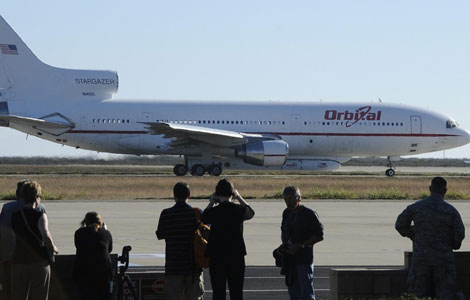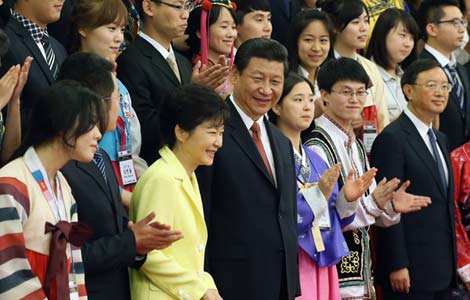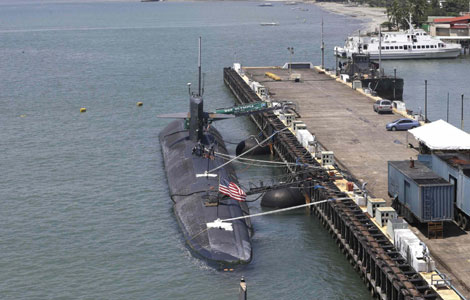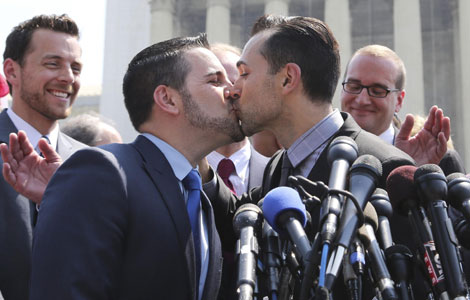Xinjiang riots a lesson for West
Updated: 2013-06-28 08:07
By Shi Lan (China Daily)
|
||||||||
At least 27 people died in riots that rocked Shanshan county, about 250 km from Urumqi, capital of the Xinjiang Uygur autonomous region, on Wednesday.
The Shanshan riots were one of the innumerable acts of terrorism since the Sept 11, 2001, attacks, which led the US-led West to label terrorism as the biggest threat to national security. But it's a pity that the Western powers still use double standards when it comes to terrorist attacks on China.
The US and its allies have spent astronomical amounts fighting the war against terrorism. But even more than one decade after the US launched its "war on terror", terrorism is far from dead. On the contrary, it is still taking the lives of innocent people from Asia to Africa, and from Europe to America.
So there is something wrong with the global anti-terrorism policy, and what can be done to fix that? One obvious deficiency is the lack of global consensus on the fight against terrorism.
Of course, the concept of terrorism varies from country to country. It depends on the circumstances and strategic goals of countries too. Nevertheless, three factors can always be used to determine whether a person's or group's action can be defined as terrorism: The use of violence or force, targeting of governments and people, and creating an atmosphere of terror to realize the objective of changing a government or society. The three key factors to define terrorism highlight its political goals, violent action and the damage it causes to society.
Different countries have different definitions for terrorism and adopted different policies to deal with it. Every country that suffers a terrorist attack has its own immediate threat to security and the right to decide its own course of action. But despite their differences, all countries agree that terrorism is evil and has been threatening the stability of global society and, hence, they have to cooperate to fight it.
In central and eastern Asia, for example, the countries that have suffered most because of terrorism have agreed that terrorism, extremism and separatism are the three evils threatening their national security and territorial integrity. The Shanghai Cooperation Organization's member states reached a consensus since the organization's inception to fight the three evils. That is a good example of regional coordination to fright against terrorism.
But even with mutual understanding and the facts being clear, some voices still differ on the issue. Most of these voices come from the West, especially the US, which distort the truth by claiming that the separatists and extremists - who would be condemned as terrorists for committing the same crimes in their own countries - are "heroes fighting for freedom and independence".
Such double standards have hurt the fight against terrorism, and helped the evil cause of terrorists.
People in Xinjiang have suffered many terrorist attacks perhaps because of the region's strategic location near Central Asia, where uncontrolled groups exploit the complicated ethnic situation to plow their evil trade. With Xinjiang making tremendous economic progress in recent years thanks to the immense support from the central government and coastal provinces, some terrorist groups fear their survival and thus launch more attacks to check the march of development.
Worse, some of the Xinjiang terrorist groups get support from the West which loves to call their usurpations acts of "independence and religious freedom", complicating the situation further. The result is deeper fear and greater misunderstanding among Xinjiang residents.
Because of the double standards adopted by the US-led West, the cost of Washington's fight against terrorism has been soaring without much success in rooting out the evil. The US has led the invasion of two countries, Afghanistan and Iraq, since the Sept 11 attacks but, far from being cornered, terrorists have responded with more attacks.
Even after May 2011 when US troops shot dead al-Qaida leader Osama Bin Laden, who was believed to have masterminded the Sept 11 attacks, attacks against American citizens and troops have not ceased. Just two months ago, explosions in Boston claimed three lives and injured many more.
A deeper look into history will show that the US has also been a victim of its double standards. In the 1980s and 1990s, the US supported terrorists in Afghanistan against its ideological enemy, the Soviet Union. One of those the US supported was Osama bin Laden. In fact, some terrorist groups threatening Iraqi people today were also supported by the US to fight former Iraqi president Saddam Hussein.
Terrorism is evil not only because of the violence it unleashes on people, but also because it has a political agenda to overthrow governments and thwart development. So it's time the US-led West gave up its double standards and coordinated with the rest of the international community, including China, in the fight against terrorism.
The author is the vice-director of Institute of Central Asia Studies, under the Xinjiang Academy of Social Sciences.
(China Daily USA 06/28/2013 page16)

 NASA telescope to probe solar mystery
NASA telescope to probe solar mystery
 Visit aids 'trust-building process'
Visit aids 'trust-building process'
 King of Pop returns
King of Pop returns
 Crowds cheer Court decision on gay marriage
Crowds cheer Court decision on gay marriage
 Hiring index signals further job weakness
Hiring index signals further job weakness
 Dance becomes popular stress relief
Dance becomes popular stress relief
 Philippine, US start Naval exercise in S China Sea
Philippine, US start Naval exercise in S China Sea
 Supreme Court gay rights ruling celebrated across US
Supreme Court gay rights ruling celebrated across US
Most Viewed
Editor's Picks

|

|

|

|

|

|
Today's Top News
Senate OKs immigration reform; hurdles remain
Snowden could request asylum in Russia: official
US collects Internet data on citizens
Boston bombing suspect accused in 4 deaths
816 elected in provincial leadership reshuffle
US adds to DPRK sanctions list
Chinese pros put trust in blogs
More Americans see Snowden as patriot: Poll
US Weekly

|

|






